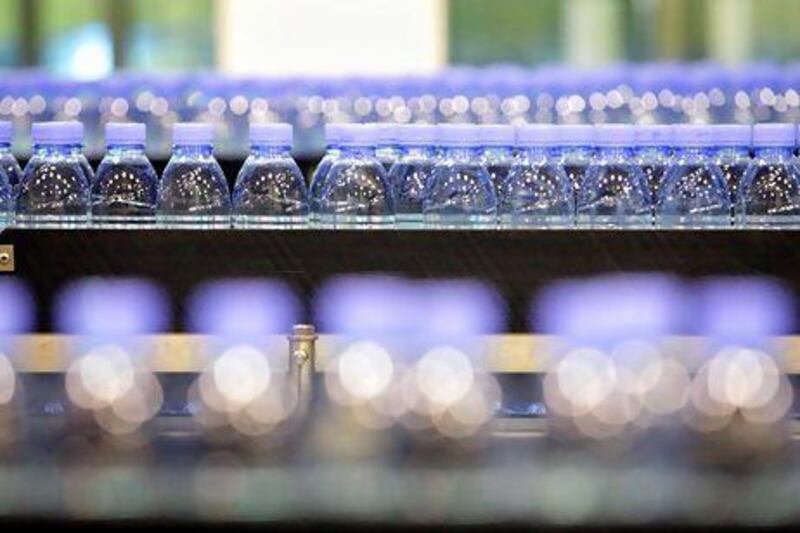A pioneering futures contract designed to ease volatility in the price of plastics on international markets is set to be launched in Dubai before the end of the year.
"For the last six months we have been looking at getting everything in place to launch a plastics futures contract by the end of 2013," said Gary Anderson, the chief executive of the Dubai Gold and Commodities Exchange (DGCX).
Many commodities markets around the world have tried to launch such a contract in the past decade. Markets in London, Mumbai and New York have all proposed the idea, but today there are no active international plastics contracts traded. A regional commodities market in Dalian, China currently trades a futures contract closely linked to plastics.
"This will be a world first of sorts as even in Dalian there is no true plastics futures contract," said Mr Anderson. "They trade a derivative of plastic called LLDPE."
The UAE is one of the world's biggest producers of polypropylene, one of the most common plastic products used in manufacturing and packaging.
Last year the Emirates produced 12 per cent of the world's polypropylene, according to DGCX data, which also shows that plastics were Dubai's second-biggest export after gold in the first half of last year.
About US$44 billion (Dh161.61bn) worth of plastics were produced in the GCC last year by companies such as Borouge, a joint venture between the Abu Dhabi National Oil Company and the Austrian manufacturer Borealis.
A Ministry of Foreign Trade study revealed last week that UAE exports of plastics grew by 127 per cent in the first half of last year compared with the same period in 2011.
The study showed the UAE produced 25 per cent of all plastics made in the GCC, with more than 600 factories across the country. Borouge is the largest plastics company in the UAE and is forecast to produce 2.5 million tonnes next year.
China and India are the biggest consumers of plastics in the world, but rely largely on buying the raw material directly from producers rather than via a commodities market.
"The price of plastics fluctuates like most other commodities," Mr Anderson said. "The problem is, though, the end users do not have a means of hedging against those price fluctuations via a futures contract. They have no way to hedge their exposure three, six or nine months forward like you would with other raw materials such as copper, for example. So we think the time is right for a plastics futures contract and that Dubai is the place to do it."
The DGCX first started to look at a plastics futures contract in 2008, but the plan was scuppered by the global financial crisis.
"As global manufacturing dropped off, the price of plastic crashed in 2008," Mr Anderson said. Plastic is priced at about $1,790 a tonne today, having dropped to $863 in 2008.
"Literally the price has returned to the same level as before the crisis," Mr Anderson said. "This price increase probably is some sort of economic indicator as consumer goods either contain plastic or are packaged in plastic, so as demand is going back up it is probably indicative of a consumer recovery somewhere in the economy."
The DGCX has been working with the Dalian Commodities Exchange (DCE) since the pair signed a memorandum of understanding in September to develop a plastics futures contract.
Dalian aims to launch its first polypropylene contract around the same time as the DGCX.
"We hope that there will be an overlap with Dalian. We are not in competition. We aim to increase liquidity. We have the producers in this region, they have the consumers in that region. We aim to bring them together with a robust futures contract traded in Dubai," Mr Anderson said.
The DGCX has also gathered a working group of plastics trading companies, producers, refiners and banks to ensure the prospective contract has the support it needs to succeed.
The working group includes international commodities giants such as Cargill and Glencore. The banks involved include Standard Chartered and Deutsche Bank.
Traders on the DGCX welcomed the move.
"Anything that attracts interest from these big players is good news for us," said Guarav Kashyap, the head of DGCX trading at the foreign exchange firm Alpari. "The market makers will be key to its success because they will bring liquidity. We always appreciate when big players like Cargill and Glencore are present on the market as it gives us liquidity and visibility."
Mr Anderson added that the ability to deliver the plastics needed to fulfil all the futures contracts would also be key to its success.
"This will not be a cash settled contract so we are looking for a location in Dubai for warehousing all the plastics we would need to make this a robust contract," he said.
It was understood that Jebel Ali was under consideration, along with other locations in the emirate.
"We will consider other countries in the GCC once we are up and running at a certain level in years to come, but initially it is important that everything we need is based here in Dubai," Mr Anderson said.





